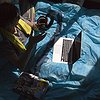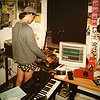Could you take us through a day in your life, from a possible morning routine through to your work? Do you have a fixed schedule? How do music and other aspects of your life feed back into each other - do you separate them or instead try to make them blend seamlessly?
At the moment I’m in a total blend of private and work environment. No fixed schedule, blessed to have room for surprises and spontaneous decisions. Let’s see. Ideally coffee, breakfast & and light office tasks in bed, half-naked in the sun, hopefully Berlin spring or summer. Often in silence until I really get the craving for music. Well, also often listening to something; repetitive HipHop Instrumentals, not too abstract meditative Electronica or some well-crafted Neo-Classical, by the likes of Nils Frahm or some of these nordish, Icelandic music nerds. To set a certain tone for my trains of thought. If I’m not too distracted by say office-todos, solving problems, running after unpaid invoices or any smartphone communication usually at some point I start thinking in musical patterns and rhythms, often words and rhymes fall into my head.
[Read our Nils Frahm interview]
I might be taking notes along the way all day, and I might realize that I have a few priority tasks to do today. Just then triggers like phone calls and messages are interfering with the actual production flow. But that’s also making sure the system is running, social media is in check etc. Then suddenly another idea pops up, takes time, might be worth following. When I realize my cruising radius so far was only ten meters in between bed, toothbrush, kitchen and my music, I might go for a swim in the public pool next door. Always helps.
Food is a must have, being in the zone I occasionally forget to eat. My neighbourhood is a constant inspiration. I might go smoke some spinach with my man Otti on the park bench. He is the 70-year old OG of a gang called ‚Kinder vom Kotti‘, which I support with production work. His storytelling and perspective always puts some interesting thoughts into my mind.
I might dive into a writing & production session in my studio then. If I’m in a social mood, I make appointments to have more conversation or collaboration. Today it was rather taking time for this interview and self-reflections. Meeting friends can be both, entirely private or mixed up professional. To be honest at the moment I’m lucky I don’t have to meet many people, which I would not consider friends and family. On the weekends I see and interact with a lot of people like travellers, securities, drivers, promoters, ravers, fans and colleagues…
Having a few projects apart of making-marketing-playing music makes a good balance for me. So I might squeeze in some design of artworks, stickers, clothing, little DIY lessons in photography or video editing or some networking related to my PUNCHI towel scarf brand. Last but not least: trying to catch enough sleep. Might be during days or nights, depending on gigs and travel patterns.
Could you describe your creative process on the basis of a piece or album that's particularly dear to you, please? Where did the ideas come from, how were they transformed in your mind, what did you start with and how do you refine these beginnings into the finished work of art?
‚Let Live’ might be a good and current example. Once Big Shug of the Gang Starr Foundation was on tour in Germany when my crew member Rob and I invited him to my studio. He is a legendary New York rapper, that I used to listen to back then when I was starting to buy vinyl records and DJing. So he came around, also Jeru the Damaja joined, who I collaborated with before.
We took a walk through the hood, it was quite a sunny and funny experience. In the studio I showed him a techy, pretty dark beat called ‚Ghetto‘, he loved it. He wrote a verse over it right away, reminiscing on his first ever tours to Berlin and Poland in the early 90s and how ‚Ghetto‘ that actually felt, in fact. Then in the middle of recording, we all suddenly got into a conversation about the whole story and also how he discovered House and Techno music with his dear friend Guru (R.I.P.), who formed Gang Starr with the earlier mentioned DJ Premier. That recording just turned out to be so damn real, that one part ended up being the main vocal in a collaborational track with Ferreck Dawn called „Let Live“ on Mother Recordings. A classic Golden Era House jam, piano-driven euphoric, positive touch, with that natural speech about how different types of music and scenes were just growing into each other, and how much he and Guru were inspired by house music, too.
The ‚Ghetto‘ track by the way is almost finished and I think it will be the third installment of my ‚Black Out Series‘ on my own label OUTTAKES.
There are many descriptions of the ideal state of mind for being creative. What is it like for you? What supports this ideal state of mind and what are distractions? Are there strategies to enter into this state more easily?
As I described before at this very moment in life I’m blessed and privileged to make a living out of this plus have a great team around. Most of the years I experienced and outlived creativity under high existential pressure and risk. This can be a driving force, as they say ‘necessity is the mother of invention’. But if you ask me for the ‚ideal state‘ it’s not. It’s a pain in the ass when your creative flow is mainly lead by economic potentials of your product. You need to eat and pay the rent.
Actually right now my apartment, my super important ‚safe space‘ and production facility is at stake. For a year and a half I have been pulled into an absurd court case, in which my landlord has been trying to evict me, for absolutely no legal reason. This was stealing a lot of time, money and energy from me, but then I flipped the script and started to turn this bad experience into creative output. So now when I receive a letter from the county court full of lies and deception by my landlord, I channel aggression, fears and emotion into a bigger story for my people, who are struggling to pay their rising rents anywhere.
How is playing live and writing music in the studio connected? What do you achieve and draw from each experience personally? How do you see the relationship between improvisation and composition in this regard?
With Robosonic so far my ‚live‘ performance is straight up DJing. There are my 4 input sources and a mixer, my crates, no painstakingly prepared playlist or cue points, always improvising. I can try out my unfinished productions, I play all my favourite producers tunes, I can jump through my own repertoire, through time, through genres, whatever. I witness how people react to it, if they feel what I do. Expectation, pressure, relief, euphoria. All the motivation to make another dance track is coming somewhere from the floor, from the crowd. Or what I personally want to hear, being part of a crowd.
How do you see the relationship between the 'sound' aspects of music and the 'composition' aspects? How do you work with sound and timbre to meet certain production ideas and in which way can certain sounds already take on compositional qualities?
I collected a lot of spontaneously found sound, made many binaural field recordings and have a chaotic archive of those, which I’m sometimes picking from. Those could be seen as compositions in a way, especially if you work them into collages and some sort of dramaturgy. But if done right harmony, tones and melody resonate more with my musical soul than just sound to be honest. Well, in techno and percussion music sure, sound and rhythm is king. I can also enjoy a well composed sound installation and acoustic experience based on pure sound, frequency modulations or noises, and it might trigger and affect my feelings in a way. I just saw the ‚Deep Web‘ audiovisual-installation in the Berlin location Kraftwerk by Henke and Bauder, with 12 lasers and a large battery of kinetic lights, at least a 4 channel audio composition.
Our sense of hearing shares intriguing connections to other senses. From your experience, what are some of the most inspiring overlaps between different senses - and what do they tell us about the way our senses work? What happens to sound at its outermost borders?
As I just mentioned the ‚Deep Web‘ one obvious connection with hearing will always be the vision. Where you don’t see musicians perform and play their instruments, stimulants like lights, lasers, screens, projections and inventive stage designs seem to fill a certain space. Think of a DJ’s performance that gets enhanced with spectacle.
I personally never took enough acid to be able to taste, touch or smell sounds and music. But I’m sure this kind of synesthesia is out there. For some people naturally, whilst others use enhancement. I recently read an article by Luciana Maneras, in which she described possibilities to rewire the haptic senses between different parts of the human body with a skin-like interface. She claimed this could help to side track your attention from a certain body part or integrate external objects into the perception of your body, as a spiritual body experience or for therapeutic use. I will spare the details but she has made a point about enhancing haptic stimulation with more haptic experience. Which made me think: is this somehow applicable to the listening experience? In sound we are working with nothing but waves and vibrating air received by our bodies, primarily the ears decoded by the brain. Be it a voice, a digital oscillator with speakers or hitting a hammer against a wall.
Art can be a purpose in its own right, but it can also directly feed back into everyday life, take on a social and political role and lead to more engagement. Can you describe your approach to art and being an artist?
I always felt attracted to subversive youth cultures, in which rebellious energy or some conscious thoughts and messages were transmitted or just formed wildly into creativity. I mean that’s my parents' generation and their record collection, the 60s 70s zeitgeist. Jimi Hendrix, Janis Joplin, Bob Marley state of mind I immediately connected with. Further it was Punk Rock, and alternative leftist culture, a little Dada and psychedelic here and there. And it was raw socially conscious, politically motivated rap that drew me into HipHop culture. Living in Argentina I got a glimpse of the South American protest culture and how it linked into music.
I do feel solidarity with marginalized progressive people that march to a different drummer, with poor and powerless people that stand up against injustice, racism, oppression. I will not say it’s an artist's responsibility to position yourself in there. But if you have the privilege to be seen, heard and followed by a tribe, you’d better do good. My mission with Robosonic is making people dance and deliver happiness, when they call for me. I do stand in for love, peace and unity. Equal rights, freedom of speech, soul survival. That comes mandatory. Not trying to teach or preach, but represent, represent.
Probably my most explicit and most political neighbourhood engagement is my contribution to the ‚Kinder vom Kotti‘ gang. Word is bond.
It is remarkable, in a way, that we have arrived in the 21st century with the basic concept of music still intact. Do you have a vision of music, an idea of what music could be beyond its current form?
Man, you don’t ask a single question that I could answer in just one sentence. Short take on this: I think IT, algorithms, big data mining and artificial intelligence will form something incredibly strange. Partly beautiful partly ugly and sad. And I cannot predict the exact behaviour of the future human beings, as I already lose touch with what’s happening on touch screens, in social networks, in virtual worlds, VR, augmented reality and mega events. Not sure if I’ll let Google install a camera in my studio, so anybody can use street view to come up watching and listening to tomorrow’s work...
But what I reckon, when AI – and this is happening – begins to make many highly-qualified jobs unnecessary, it might be the most creative and inventive humans that become the ‘unique selling points’ in the shop called earth. Let’s hope those people make really good music and that they build sharp tools to save our beautiful beat-up planet.




